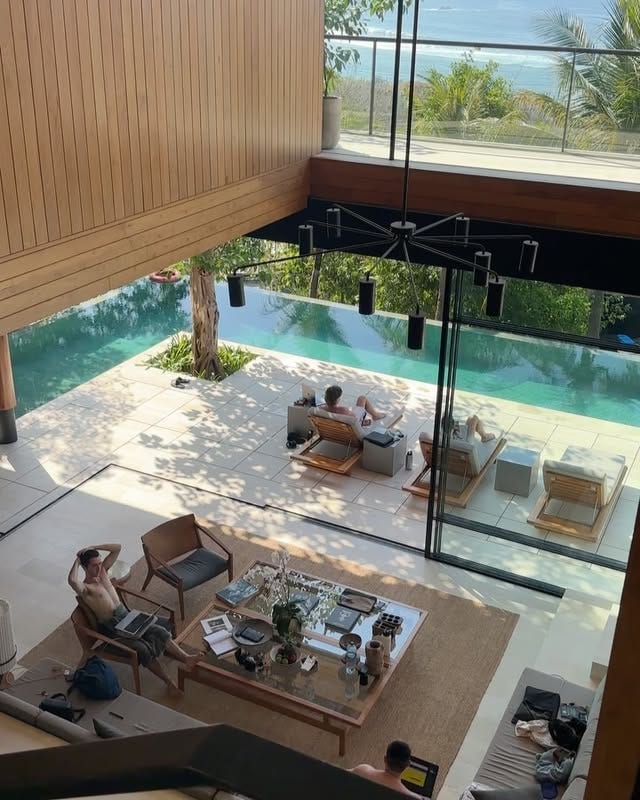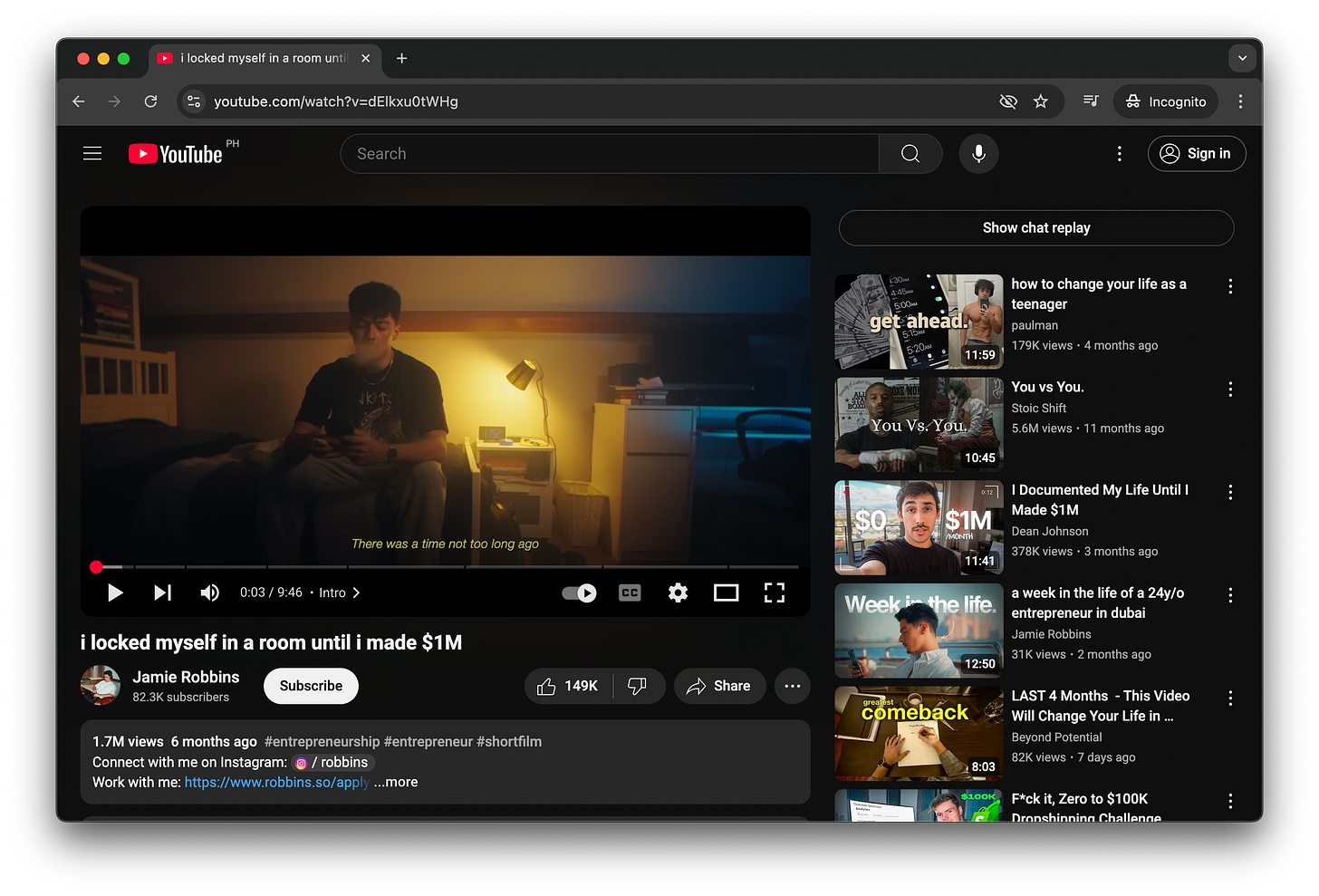Enter: The Post-Manosphere
From Hong Kong to Dubai to Bali, male creators are scripting a life beyond the manosphere. But is it progress from what came before, or just another grift?
There’s a part of my algorithm that looks like this:
All these videos make the world look like it’s in an eternal golden hour. Warm light kisses the frames, and the sun is forever setting on green grass or sandy beaches. There’s always a filmic quality to it—warm, colorful tones, a grainy texture, and footage stitched together with red flare transitions. Everyone is young, attractive, blonde or brown-haired, and smiling. They all have tanned, golden skin. For some reason, they’re always exercising: going on group runs or hikes, playing a team sport, swimming in pools. An unnecessary number of the men—it’s mostly men in the videos—are shirtless. As they stand and flex, the sunset casts a shadow on their well-yolked biceps or chiseled abs glistening in sweat.
These posts belong to two different content creators based in the Asia-Pacific: Daniel Dalen, a Dutch entrepreneur based in Hong Kong who shares longform vlogs of himself travelling between Bali, Dubai, and the Chinese Mainland; and The Art of Mondays (AOM), a global founder’s network that hosts meetups and retreats for entrepreneurs in cities like Bali, Cape Town, and Mykonos, launched by two Australians named Jai Howitt and Evan Bryce. It isn’t entirely clear what these “entrepreneurs” actually do: Dalen’s website first links you to a small glasses brand and then a B2B China ecommerce service, while founders in AOM’s retreats seem to spend more of their time hanging out and socializing than getting any work done.
The work—how much of it they do, if at all—does not seem to be the main focus. But to their cult-like followings (Dalen’s YouTube channel has 182,000 subscribers and AOM is followed by 108,000 on Instagram), these creators make the fantasy world of the internet entrepreneur a little bit more knowable. And the bottom-line of their content is this: if, like Daniel, like Jai and Evan from AOM, you start a business, escape the zero-sum game of the corporate rat race, your life will look like theirs. Your days will morph into an endless summer, where the grass is always green and the sun is always shining and everything looks like it’s captured on film. Time will be plentiful because your calendar is flexible and that business you launched generates “passive income.” And each day is another day to frolic under the sun with friends.
When these creators do talk about work, you can hear the same vague platitudes about “discipline,” “determination,” blah blah blah that are canon to the hustle bro internet. “They call it luck… I call it relentless effort,” reads the text stitched on one of Dalen’s Instagram reels, while a somber remix of Harry Styles’ “As It Was” plays in the background. On an AOM video, a voiceover of the classic Tim Ferris’ entrepreneurial adage is mixed with the soft sound of a piano: “You’re going to be the average of the five people that you spend the most time around,” Ferris’ voice says. “So choose those people as well as you can.”
There are a similar set of creators across the world that also share visual language for bright, idyllic, endless summers. They also all happen to be entrepreneurs based in (or traveling around) the Asia-Pacific sharing the same “work hard”-isms of Daniel Dalen and AOM with film-like color grading: Alfie Robertson, an Australian fitness influencer, sells a gym/health/wellness coaching program and shares bite-sized life lessons through film-filtered Instagram videos. Another creator, Fin Kwong, stitches film-graded videos of himself working out side-by-side with clips of him grinding on a laptop.
It all stinks of manosphere: the odd obsession over physical appearance, adjacency to gym bro culture, and appeals to “discipline” and “hard work” without any substance or specificity. It’s like Chris Williamson if he actually looked happy or Andrew Tate if you put him in the sun and censored everything racist or misogynistic. And the messaging is exactly the kind that would appeal to the growing number of young men feeling lost and disaffected.
In an extended ethnography on the manosphere internet, Joey Zeelen, Amsterdam-based researcher and founder of STUDIO OUTLIER, writes that “At its core, the manosphere is a patchwork of communities offering different answers to the same questions: Who am I as a man? What’s my role in society? Why do I feel left out? What’s my place in the world of sex and attraction?” The chiseled, sun-kissed creators like Daniel Dalen and AOM—with their maxims on hard work, discipline, and finding joy through it all—seem to be answering somewhat similar questions.
But color alone tells you that something about these creators is different. The manosphere is typically imagined as a dark place: podcast episodes of creators Andrew Schultz or Joe Rogan are filmed in brooding basements; incels talk endlessly of The “Blackpill,” while the chad—the manosphere’s ideal man—is often imagined in the dark, pictured in black-and-white. How does that compare to AOM’s sunny fitness retreats in Bali, or Daniel Dalen’s mid-summer hikes in Hong Kong and early morning runs in Dubai?
These creators are ushering in a new internet genre that I call the post-manosphere.
A lot of writing has been dedicated to what happens when men find themselves sucked inside the manosphere. Not a lot, however, has been written about what happens when they get out of it. The post-manosphere is a prime example.
The myth of the post-manosphere man begins by breaking free from a life of mediocrity and underachievement—the kind that pulls men into the manosphere in the first place—and launching a seven-figure business as an escape hatch. Daniel Dalen was once a high school dropout before he began launching his company and then traveling around the world. AOM’s founders share similar beginnings: dead-end jobs, accruing debt, launching businesses, and finally making it work after several failed attempts. Jamie Robbins, a member of Dalen’s entourage, shares an identical origin story in a YouTube video titled “i locked myself in a room until i made $1M.” “I was … getting home at 4am, waking up at noon, vaping my brains out, and drowning in video games,” he narrates. But working in isolation for a year straight, he’s now the founder of Cinegrams, an online business selling color grading assets. It helps to note that Robbins is likely responsible for pushing the post-manosphere’s visual language forward: Cinegrams’ assets seem to have democratized the bright, filmic video filters for social media creators of all kinds.
The rapid upshot from mediocrity to success all feels very “This Could Be Me One Day,” a soothing and hopeful story for lost, frustrated young men. In that sense, it’s a lot like the manosphere. Zeelen writes that the manosphere “speaks to real needs of men like belonging, status, control, and identity, that many are struggling to meet in healthy ways.” But with their sun-kissed friend groups, social media followings, businesses, and flexible schedules that allow them to travel around the world, post-manosphere creators seem to have these needs sorted already.
It’s also no accident that the post-manosphere largely operates outside the West. The leading creators are European and Australian, sure, but they travel around Hong Kong, Bali, and Dubai—global capitals with freer markets, more cultural conservatism, and much less gender-war conflicts when compared to the West. The manosphere, in contrast, is based largely in America and the UK but always dreamed of these exact distant lands: Bali and Dubai as libertarian tax havens for hustle-bros; Asia for more “subservient” women. In living outside the Anglosphere, the post-manosphere man is living the manosphere’s dream, transcending its purgatory of dark basements at home in favor of endless summers and passive income abroad.
I have a number of friends who follow—and are fans of—this sort of content. It’s fun, optimistic, aspirational, and doesn’t have the whole misogynistic baggage that other manosphere creators might have. But I’ll also say that I know enough entrepreneurs—many are friends and family—whose lives do not involve frolicking around cities with warm weather, or whose idea of “working hard” involves more hours in front of a computer screen than playing sports and looking hot. And whenever they give me advice they offer more than just a couple of nothing burgers on “discipline” or “grinding” or “hustling.”
So is the post-manosphere just a big grift? Are these men faking a lifestyle success and giving young, lost men a false sense of hope? I have my answer. But yours probably depends on whose idea of “hard work” and “discipline” you’d rather trust… mine or a YouTuber’s?








Listen to enough of these guys and they say largely the same generic advice your parents give. It's just cheap dopamine but brilliantly packaged.
Would be great if you continue to explore the pilates and pickleball girl era that is sprouting like mushroom in Asia 🫠